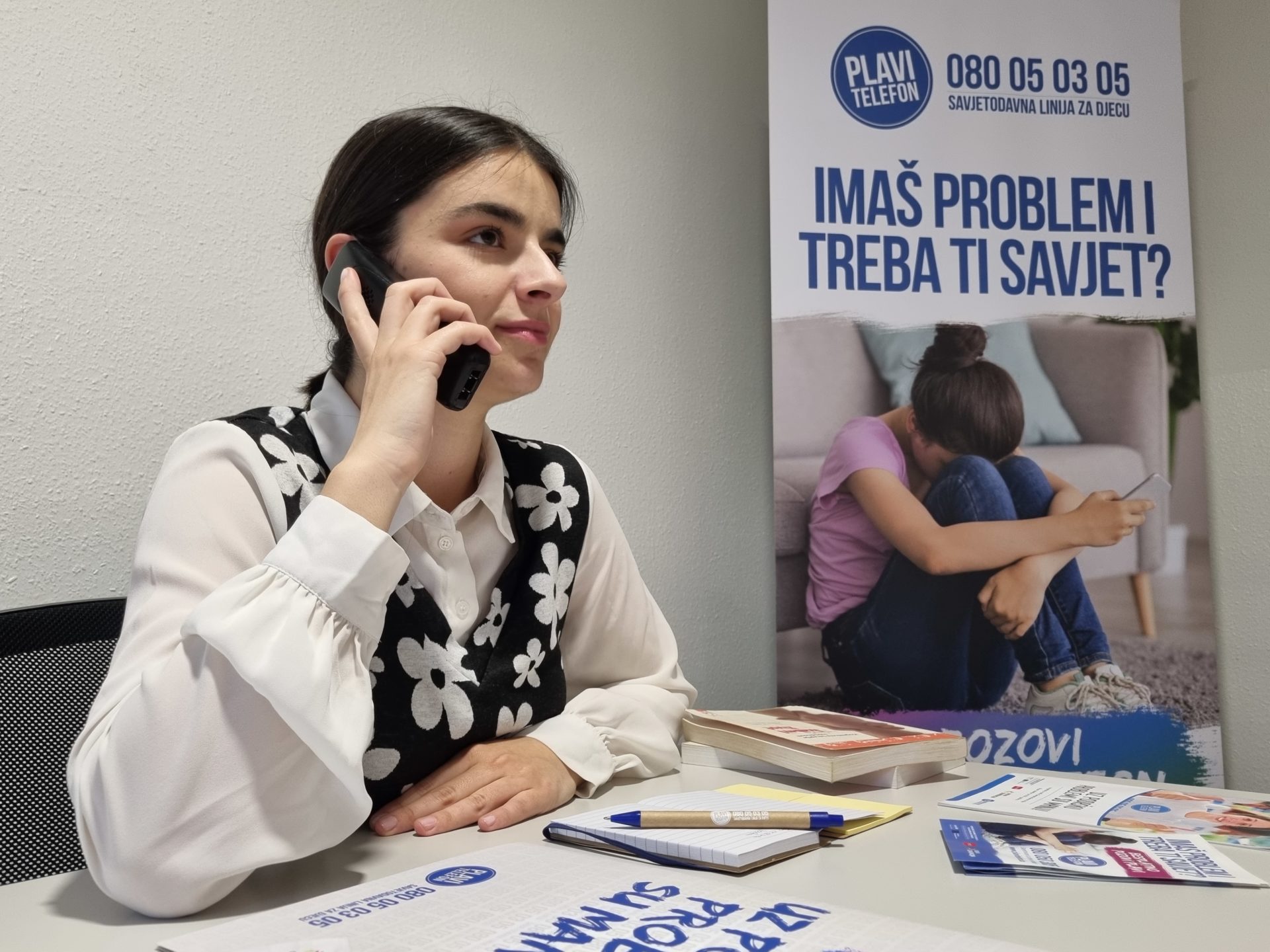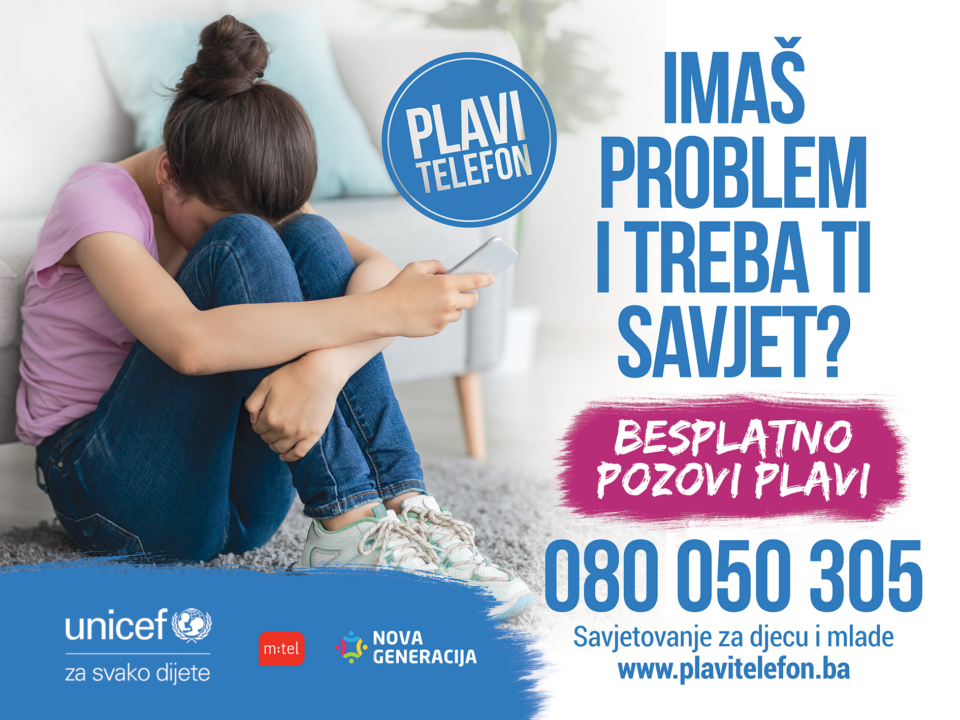
The Plavi Telefon [Blue Telephone] counseling helpline was established by the Nova Generacija association primarily to provide psychological support to children and young people in Bosnia and Herzegovina. Over the course of a decade, they have received approximately 60,000 calls, most of which have come from children and teenagers between the ages of ten and 18
Maja Kovačević, the helpline operations coordinator, reported that they have also received around 6,000 e-counseling inquiries, where clients and counselors correspond via e-mail, online chat, or social networks.
“More than 210 reports of suspected violence have been sent to the competent authorities,” explained Kovačević. Highlighting the annual increase in call volume, she noted that the helpline has received twice as many calls this year compared to last year. In the first half of last year, she recalled that they received 15 reports of suspected violence, whereas this year, there were 40. On a monthly basis, they receive roughly 1,500 calls. The majority of callers are children and teenagers aged ten to 18, with girls aged 14 to 18 and women aged 18 and above being the most frequent callers. Boys and men call the helpline less frequently.
Jelena Zelić, a consultant working on the Plavi Telefon helpline, says that callers usually just want to be heard, to be given space to express their thoughts and emotions.
“For them, Plavi Telefon represents a safe place where they can either get short-term relief or come to some important realizations and insights about themselves. At the same time, they expect support and specific guidance from us as advisors, if we can give them that in accordance with the situation. Major emphasis is placed on the relationship of trust between the client and the advisor,” explained Zelić.
In addition, they receive requests to report violence, to intervene and mediate between users and institutions, for referrals to mental health and psychotherapy centers, as well as centers for free legal assistance to solve their problems.

The citizens of Bosnia and Herzegovina are aware that Plavi Telefon exists, Kovačević says, which is proven by online promotional activities, which showed that 1,300,000 citizens were aware that this free advisory assistance exists. Comparing the current call volume to that of a decade ago when the helpline was established, she notes that they are now receiving 15 times more calls. Kovačević says that these figures show that citizens have confidence in Plavi Telefon’s services.
Guidance and Counseling
The Plavi Telefon helpline was launched in 2013 by the Banja Luka-based association Nova Generacija. Their team consists of psychologists and social workers focused on promoting and protecting human rights, particularly those of children, and implementing programs to protect vulnerable groups. Their activities include a day care service for at-risk children, a counseling center for children and young people, and a reception center for children found to be without homes or panhandling. Noticing the absence of a counseling helpline, they established Plavi Telefon, which offers counseling and consultation services as well as information related to legal rights in the realm of social protection.
Plavi Telefon’s primary goal is to provide psychological assistance and support to children in crisis and hardship, particularly in cases of violence and exploitation. However, according to Kovačević, children recognize Plavi Telefon as a safe place where they can talk about a variety of topics that are important to them. They have also gotten involved in working with young adults, expanding their focus to include mental health, family relationships, friendships, and sexual and reproductive health.
“Plavi Telefon is currently the only counseling helpline offering assistance to help children throughout Bosnia and Herzegovina, regardless of the nature of the hardship for which they are seeking help,” Kovačević pointed out.
Maja and Jelena began working with Plavi Telefon as volunteers, later transitioning to full employees. Both emphasize that their work has provided them with an opportunity for both personal growth and professional development. They underscore the capacity to empathize with the various situations they encounter in their work, holding the opinion that without compassion, it’s impossible to effectively provide these services. One of their main challenges is establishing clear boundaries with clients in order to remain within the domain of their advisory roles.
Discussing efforts to reduce the prejudices and taboos surrounding mental health topics, Zelić references their promotional activities on social media, including texts, TV shows and podcasts featuring knowledgeable guests, and other means of disseminating information. She says that these initiatives have great potential to break down taboos, bringing the discussion of mental health closer to the general public which might be ill-informed about these topics.
“We had one user who gave us positive feedback in response to our posts about mental health on social media. The user told us that this post influenced her awareness of the problem and helped her find a solution. It’s certainly one of the useful ways to show people with real-life examples that asking for help isn’t out of the ordinary and doesn’t need to be a terrible and shameful experience,” explained Jelena.
She emphasized the importance of taking an individual approach to each person and being willing to deal with certain problematic topics. Additionally, Zelić asserts that professionals should make themselves available to the general public and “dispel myths about these topics using simple and understandable language for people of different age groups.”
As a counselor at Plavi Telefon, she clarified that users are aware of the helpline’s range of services, including guidance and counseling.
Unique European Number
Concerning future plans, Kovačević shared some of the upcoming initiatives intended to enhance their services and increase customer satisfaction.
“The projects and activities that we’re working on are focused on improving our services. Customer satisfaction with our services is important to us. In the near future and in the long-term, our goal is to make the Plavi Telefon helpline available 24/7, as well as to ensure institutional recognition and long-term system support. Our current working hours are from 9:00 a.m. to 10:00 p.m. every weekday,” she explained.
Additionally, they are working to obtain the unique European number 116111, shared by most helplines for children and young people across Europe. In practice, this would that when a child or young person from Bosnia and Herzegovina travels to another European country, they could easily call and access these services. “We are actively in the process of working on this, together with our partner UNICEF in Bosnia and Herzegovina, which supports our activities,” concludes Kovačević.






